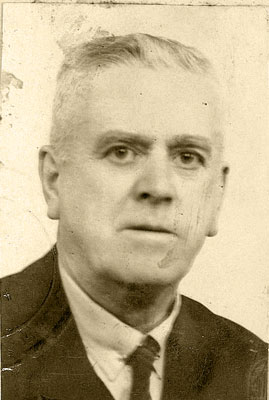Lieutenant Norman ffolliott Darling

Norman ffolliott Darling was born on 18 November 1888 in Market Street, Lurgan, County Armagh, the fourth of eleven children of medical practitioner John Singleton Darling and his wife Ada Elizabeth Jane Darling (née Belcher). Following an education at Lurgan College, in February 1909 he emigrated to Argentina, sailing from Cardiff on board the cargo ship El Argentino. The ship's paperwork records his occupation as a farmer. He returned home to Lurgan, however, in December 1913.
Darling enlisted in the North Irish Horse at Belfast on 8 August 1914 (No.960), just four days after the declaration of war. He was described as being 5' 6½" tall, with brown hair and grey eyes. He gave his occupation as 'meteorological'.
On 20 August 1914 he embarked for France with C Squadron of the North Irish Horse, seeing action in the Reatreat from Mons and the Advance to the Aisne. On 24 September his officer, Lieutenant Barrie Combe, mentioned him in a letter to his (Combe's) wife:
Greer [&] McNeil the two gentlemen recruits who you saw at the Northern Counties Hotel have proved a great success. They are two of the best men I have got. Also I have a son of Dr Darling in my Troop and a young Coey – all good men.
Combe was killed in action six days later. On that day, Combe and his troop were taking their turn at the observation post overlooking the enemy lines on the Aisne. Soon after midday he was ordered to ascertain whether the Germans had evacuated Condé village, which sat on the far side of the bridge, in the shadow of Condé Fort. Combe set out with Darling, his orderly, telling his sergeant that no search party should be sent if they did not return. Passing through the line of picquets, they rode to within 200 yards of the bridge. Combe left Darling and their two horses under cover and proceeded on foot. After a couple of hours Darling went in search of his officer. He made his way to the bridge and hunted up and down the river bank but finding no trace, returned to the outpost, reporting the officer's disappearance.
Darling was promoted to lance corporal on 7 December 1914. On 22 July 1915 he was commissioned in the field as a 2nd lieutenant in the North Irish Horse. He was immediately posted to the regiment's reserve at Antrim.
On 11 January 1916 he embarked for France as one of the officers of E Squadron, which was then serving as divisional cavalry to the 34th Division. He was promoted to lieutenant five days later. The squadron's war diary refers to Darling taking ten NCOs and men on a sniping course on 10 February, and putting his sniping skills to use in the trenches over ten days at the beginning of April.
In May 1916 E Squadron joined with A and D Squadrons to form the 1st North Irish Horse Regiment. The regiment served as corps cavalry to VII, XIX then V Corps through 1916 and 1917.
Darling attended a course at the 3rd Army Infantry School from 7 September to 14 October 1916, and another at the 3rd Cavalry Division School from 7 to 18 November.
At the end of December 1917 Darling went home on leave, but while there he fell ill and was admitted to hospital. In February a medical board found that he was unable to return to front-line service, and he was posted to the reserve regiment at Antrim. In December 1918 he was posted for duty with the Ministry for Labour in London.
He was demobilised on 7 May 1919 and relinquished his commission 1 April 1920, having been awarded a pension due to injuries to his face and abdominal adhesions, which were attributed to his military service.
On 23 July 1921 Darling married Olive Mary Pedlow, the daughter of a medical doctor, in Ballycastle Presbyterian Church, County Antrim. Norman was employed as a clerk in the civil service while Olive later became a doctor, working as a surgeon and anaesthetist.
The 1924 Belfast Directory gives their address as 235 Antrim Road, Belfast. By 1932 they were living at 12 Cliftonville Road.
At the beginning of the Second World War Darling offered his services in the Reserve of Officers, but this may not have been taken-up given his age.
He died at his home, 12 Cliftonville Road, on 21 April 1967.
Three of Darling's brothers also served during the war. Lionel Scott Darling enlisted in the 5th (Royal Irish) Lancers before being commissioned as a 2nd lieutenant and posted to the Royal Irish Fusiliers. He served in France with the 9th (Service) Battalion from October 1916, but fell seriously ill with rheumatic fever in February the following year. Following his return to duty he was held on the strength of the 3rd (Reserve) Battalion while employed as an instructor in the Officer Training Corps at Belfast. He was later attached to the Ministry of Labour. He relinquished his commission due to of ill-health contracted on active service on 7 March 1919. Owen Richard Darling was commissioned as a 2nd lieutenant in the Royal Irish Fusiliers in November 1915. He later served in the 11th Battalion, Royal Irish Rifles, before transferring to the Indian Army in early 1918, serving in the 74th Punjabis. Ronald Henry Darling was serving as a lance corporal in the 14th Battalion, Royal Irish Rifles, when he was killed in action at Passchendaele on 16 August 1917.
This page last updated 21 April 2024.
